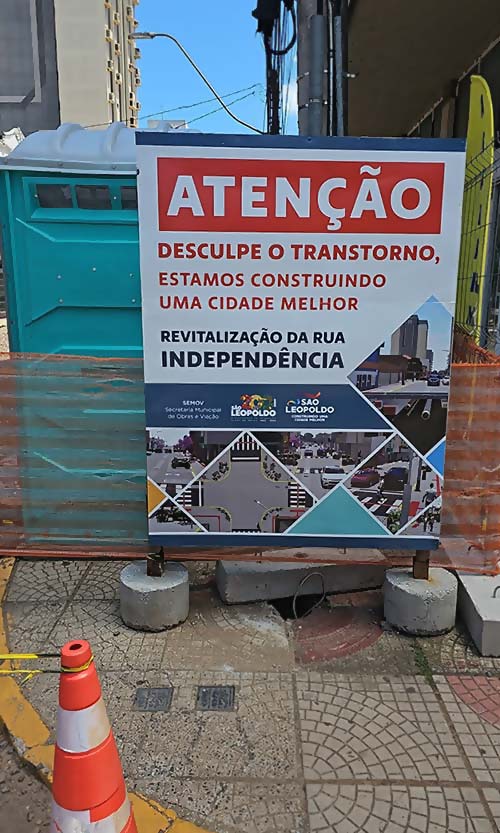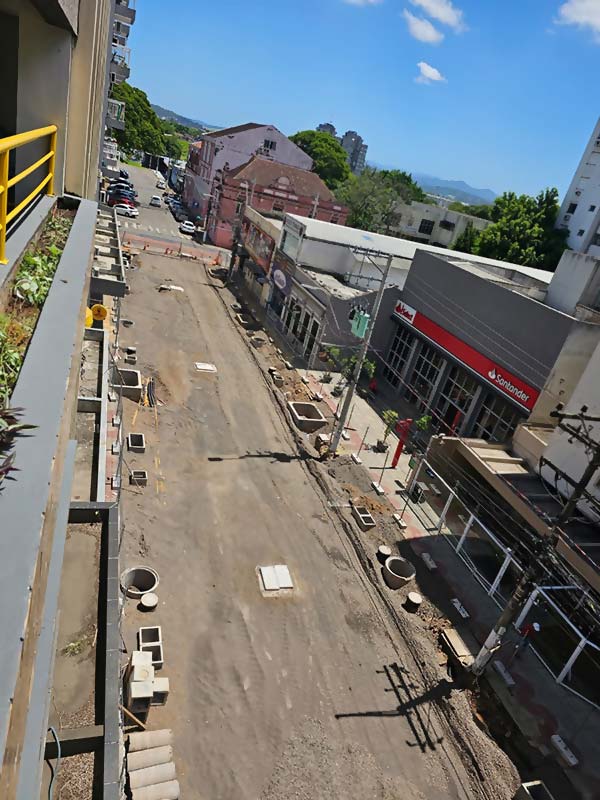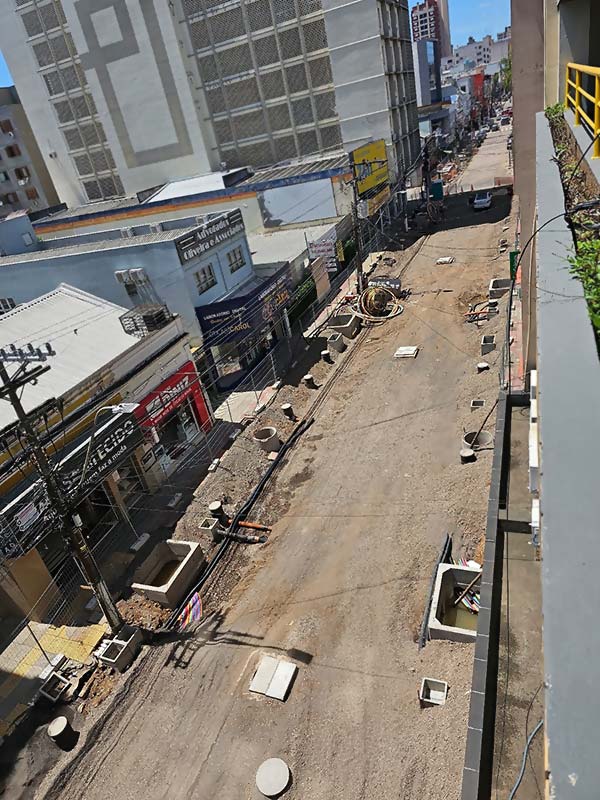| SERIES: DISGOVERNMENT OF THE DAY |
A The decision to interrupt works between December 24, 2023 and January 2, 2024 is not just a setback; It is a nonsense that calls into question the planning capacity and social sensitivity of São Leopoldo’s current management.
When São Leopoldo City Hall announced, with pomp and circumstance, the revitalization of Rua Independência in October this year, the optimism among local traders and residents was palpable.
The promise, widely publicized, was that the works would bring new life and dynamism to the stretch. However, two months after the beginning ceremony, the reality that prevails is that of the inertia and silence of the machines.
Since October 25, 2023, the first block of Rua Independência has been filled with a scenario of expectation for an improvement that, so far, at the end of December, seems to have evaporated along with the noise of the first demolitions.
The work, which should be a symbol of progress, became an emblem of frustration, especially for local businesses which, in the middle of the Christmas sales season, see their revenues drop precipitously.
The unexplained strike calls into question the effectiveness of municipal management and challenges the trust placed in local authorities.
Merchants, who were encouraged to support the initiative, now find themselves in a precarious situation, having to deal with a decrease in customer flow and, consequently, a reduction in their revenue. The impact is felt in every empty store and every service not sought after.
And to make the situation even worse, even in the face of the difficulties imposed by the municipal management itself, which are disrupting commercial revenue at a time when it should be more profitable, Mayor Ary Vanazzi did not present palliative measures such as a reduction or exemption in the payment of IPTU while the works continue.
This stance highlights a worrying disconnect with the reality faced by Independence traders, pointing to a lack of sensitivity and understanding of how local commerce is affected by such urban interventions.
The current situation suggests that São Leopoldo City Hall may be on the verge of facing a wave of compensation claims, as traders seek compensation for losses suffered due to the work stoppage.

The civil liability of the State, so debated in similar cases, here appears as a ghost haunting the Public Power, which could be called upon to answer for the damage caused by the interruption of the promised progress.
The community awaits answers and the resumption of works with an urgency that goes beyond simple inconvenience. Urban development is essential and the modernization of Rua Independência is a project that can bring numerous benefits.
However, public administration must remember that its commitment goes beyond project execution: it must ensure the well-being and economic stability of citizens impacted by its actions.
Now, with Christmas just around the corner and works at an impasse, eyes are turning to City Hall in search of a clear position and concrete actions.
The traders on Rua Independência no longer just ask for the work to be completed: they demand respect and consideration for the difficulties they face.
The city hall is not only racing against time to resume the project, but also to avoid greater losses, which extend beyond the financial, affecting its credibility and its ability to manage the city’s interests.
Public works, although fundamental for urban development and the modernization of cities, cause a series of inconveniences that can significantly affect the lives of the local population.
Routines are changed and properties can be devalued amid chaos and nuisances such as blocked roads and excessive noise.
Such disorders, known as the “fact of the work”, impose a debate on the civil liability of the State, which may be obliged to compensate for damages not due to illegality, but due to the principle of disproportionate bearability of the damages caused to citizens.
Historical examples, such as the case of “Minhocão” in São Paulo, demonstrate that the Judiciary can determine that the State compensates individuals harmed by works.
Recent decisions, such as those of the Superior Court of Justice in 2017, reiterate that, if the damages arise directly from the execution of the work, it is the responsibility of the public administration to respond for them and compensate those who were affected.
Given the current pace of works, such as Rua Independência, which could last for more than 30 months considering the estimate of three months per block and a total of ten blocks, the possibility of compensation for affected traders and residents becomes increasingly concrete.
The losses resulting from disruptions may be subject to compensation, and it is clear that, in the advancement of cities, the State must balance progress with justice and due compensation to citizens who suffer the negative consequences of these ambitious projects.
The situation on Rua Independência seems to border on the unbelievable, as a public project of such magnitude and complexity allows itself an inexplicable hiatus, extending from Christmas to the dawn of the new year.
The impact is visible and dramatic: business paralyzed, sales suspended and essential services interrupted, a true chain of disruptions that render commercial dynamics useless in a traditionally profitable period.
Mayor Ary Vanazzi, by neglecting the consequences of this extended pause, seems to ignore the heat of the flames with which he plays. It is worth remembering that, in politics, whoever plays with fire can end up getting burned, and popular discontent can be the trigger that turns this strike into a spark for future political controversies.
Reference:
NH NEWSPAPER. It’s official: the revitalization of Rua Independência begins. Available in: https://www.jornalnh.com.br/noticias/sao_leopoldo/2023/10/25/e-oficial-comeca-a-revitalizacao-da-rua-independencia.html. Accessed on: 27 Dec. 2023.
MOLIN NETO, Walmor Francisco. Civil liability and execution of public works. Digital Journal of Administrative Law, Ribeirão Preto, v. 5, no. 1, p. 267-280, Oct. 2017. Available at: www.revistas.usp.br/rdda. DOI: 10.11606/issn.2319-0558.v5n1p267-280. Accessed on: 27 Dec. 2023.









